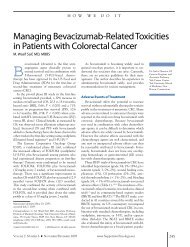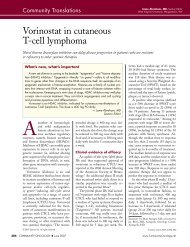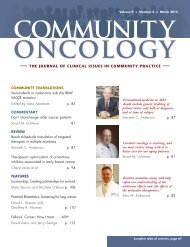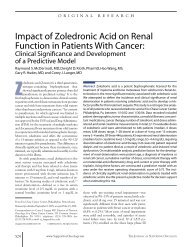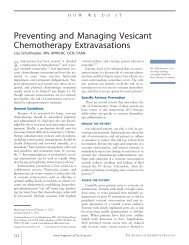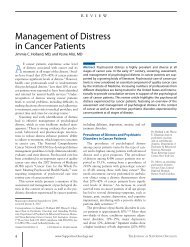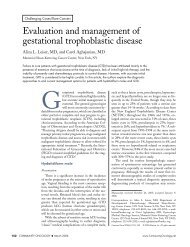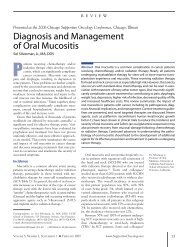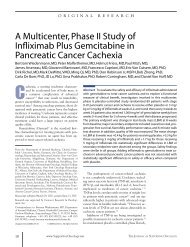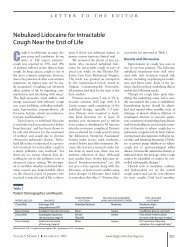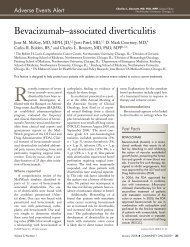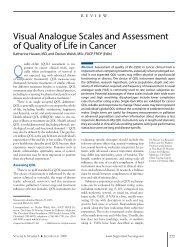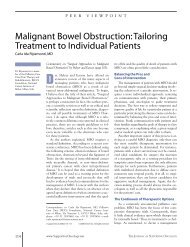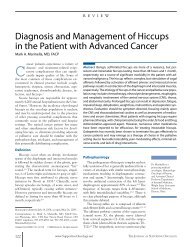Evaluating the “Good Death” Concept from Iranian Bereaved Family
Evaluating the “Good Death” Concept from Iranian Bereaved Family
Evaluating the “Good Death” Concept from Iranian Bereaved Family
Create successful ePaper yourself
Turn your PDF publications into a flip-book with our unique Google optimized e-Paper software.
Recognizing Depression in Patients with Cancer<br />
basic antidepressants, and many are willing to prescribe <strong>the</strong>se<br />
for patients who meet <strong>the</strong> diagnostic criteria for depression,<br />
especially since it takes weeks to achieve adequate <strong>the</strong>rapeutic<br />
levels for many of <strong>the</strong>se drugs. Recognizing <strong>the</strong> presence of<br />
depression is thus a key diagnostic intervention.<br />
Several efforts have been made to develop self-report<br />
screening inventories that can improve <strong>the</strong> accuracy and<br />
efficiency of detection of depressive symptoms and are brief<br />
enough to administer in <strong>the</strong> setting of an office visit. Some<br />
tools have been validated and correlate well with more detailed<br />
inventories, although <strong>the</strong> gold standard remains <strong>the</strong><br />
detailed psychiatric interview. 25 A single-item interview<br />
screening proposed by Chochinov et al 25 years ago performs as<br />
well as or better than longer instruments and is remarkably<br />
simple to remember. Asking patients “Are you depressed?” in<br />
a brief screening interview correctly identified <strong>the</strong> eventual<br />
diagnostic outcome of every patient in initial studies and has<br />
been adopted broadly by oncologists and palliative care clinicians<br />
caring for patients who are terminally ill.<br />
We support immediate referral to a psychiatrist for any<br />
patient who exhibits symptoms of depression, and <strong>the</strong>re is<br />
universal agreement that any person who may be suicidal<br />
should be referred immediately for urgent psychiatric evaluation.<br />
In practice, however, <strong>the</strong>re are two main barriers to<br />
successful referrals for those who may be considered to be<br />
“managing” and not considered at risk for suicide: Patients are<br />
sometimes resistant to or reluctant to accept a recommendation<br />
for referral, and <strong>the</strong> shortage of mental health professionals<br />
trained in psycho-oncology limits quick access. It is,<br />
<strong>the</strong>refore, not surprising that cancer clinicians often initiate<br />
pharmacologic <strong>the</strong>rapy for depression and provide emotional<br />
support to patients and families. Kadan-Lottick and colleagues<br />
5 reported that although 90% of patients agreed that<br />
<strong>the</strong>y were willing to receive treatment for emotional distress<br />
associated with <strong>the</strong>ir cancer diagnosis, only 28% accessed<br />
treatment. Approximately 55% of <strong>the</strong> patients diagnosed in<br />
that study with major psychiatric disorders did not access<br />
treatment. It has been our experience that oncologists are<br />
often willing to initiate pharmacologic <strong>the</strong>rapy while <strong>the</strong><br />
patient is waiting for an appointment with a specialist.<br />
The most frequently prescribed antidepressant medications<br />
are <strong>the</strong> selective serotonin reuptake inhibitors (SSRIs). Frequently,<br />
<strong>the</strong> choice of antidepressant is based on <strong>the</strong> sideeffect<br />
profile of a particular medication as <strong>the</strong>re are many<br />
effective options, none of which appears to be significantly<br />
more efficacious than <strong>the</strong> o<strong>the</strong>rs. 7 Antidepressants considered<br />
to be sedating may not be <strong>the</strong> preferred option for patients<br />
who have significant neurovegetative symptoms including<br />
fatigue and low energy. Conversely, antidepressants that<br />
cause anorexia and insomnia are poor options for patients<br />
experiencing sleepless nights and continued weight loss. Options<br />
for more activating antidepressants include sertraline,<br />
escitalopram, bupropion, and venlafaxine, while more sedating<br />
antidepressant medications include paroxetine and mirtazapine.<br />
7 Methylphenidate, a drug frequently used to treat<br />
attention-deficit/hyperactivity disorder, has been very effec-<br />
tive in patients with low energy and anorexia. 26,27 Starting at<br />
a low dose in <strong>the</strong> morning, especially in <strong>the</strong> elderly, helps to<br />
minimize tachycardia and sleeplessness, which can be unwanted<br />
side effects of this medication. Lastly, a key point<br />
when choosing a medication is <strong>the</strong> potential for drug–drug<br />
interactions. Multiple antidepressants, including paroxetine,<br />
fluoxetine, fluvoxamine, and bupropion, interact with <strong>the</strong><br />
cytochrome P-450 2D6 system, making <strong>the</strong>m more likely to<br />
interact with medications commonly used in oncology. 28 One<br />
example of this potential for interaction occurs with tamoxifen,<br />
which is metabolized into its active form, endoxifen, by<br />
<strong>the</strong> cytochrome P-450 2D6 system. It may not be available in<br />
adequate concentrations in <strong>the</strong> setting of antidepressant medications<br />
like paroxetine, an inhibitor of cytochrome P-450<br />
2D6. Whe<strong>the</strong>r this ultimately influences <strong>the</strong> efficacy of anticancer<br />
treatment is still under investigation.<br />
While psycho<strong>the</strong>rapy is outside <strong>the</strong> scope of most practicing<br />
oncologists, it may be helpful to provide patients with<br />
some guidance about <strong>the</strong> range of available <strong>the</strong>rapies. Individuals<br />
may express a clear preference for nonpharmacologic<br />
treatments, so it is important for cancer clinicians to familiarize<br />
<strong>the</strong>mselves with a few such options. These include<br />
cognitive behavioral <strong>the</strong>rapy (CBT), intensive psycho<strong>the</strong>rapy,<br />
and group <strong>the</strong>rapy. These interventions can aid patients<br />
in reducing anxiety and in streng<strong>the</strong>ning <strong>the</strong>ir personal coping<br />
mechanisms. Studies to rigorously evaluate <strong>the</strong> efficacy of<br />
<strong>the</strong>se interventions have been challenging to complete because<br />
of <strong>the</strong> lack of a “gold standard” definition of depression<br />
in cancer, no consensus on an appropriate length of treatment,<br />
no clear way to monitor compliance with a given<br />
<strong>the</strong>rapy, and varied definitions of appropriate end points. 12<br />
Despite <strong>the</strong> challenges, several meta-analyses have been compiled<br />
to sort through <strong>the</strong> data. The more commonly referenced<br />
meta-analyses have included thousands of patients undergoing<br />
nonpharmacologic interventions ranging <strong>from</strong><br />
individual psycho<strong>the</strong>rapy to group <strong>the</strong>rapy as far back as<br />
1954. 29–34 None of <strong>the</strong> interventions indicate that any particular<br />
<strong>the</strong>rapy is more clearly beneficial than ano<strong>the</strong>r.<br />
CBT has received recent attention and appears to be a<br />
good option for many cancer patients with depression. A<br />
review by Williams and Dale in <strong>the</strong> British Journal of Cancer in<br />
2006 33 outlines 10 studies focusing on <strong>the</strong> use of CBT in<br />
cancer patients with mixed results. Of <strong>the</strong>se, only two found<br />
CBT to be ineffective, whereas <strong>the</strong> rest demonstrated some<br />
benefit in reduction of depressive symptoms and improvement<br />
in quality of life for patients with a wide assortment of primary<br />
malignancies. Most found early improvement in symptoms<br />
but not necessarily long-term persistence of <strong>the</strong> initial positive<br />
effects. Group <strong>the</strong>rapy has also been thoroughly studied<br />
in depression in cancer patients since Spiegel’s landmark<br />
study in <strong>the</strong> late 1980s and has been shown to decrease<br />
anxiety, depression, and pain and to increase effective coping.<br />
34–39 Many patients report positive experiences in support<br />
groups, but o<strong>the</strong>rs express an intuitive fear that listening to<br />
o<strong>the</strong>r patients’ concerns and negative thoughts will impair<br />
<strong>the</strong>ir own overall mood and outlook. Not all patients feel<br />
56 www.SupportiveOncology.net THE JOURNAL OF SUPPORTIVE ONCOLOGY



